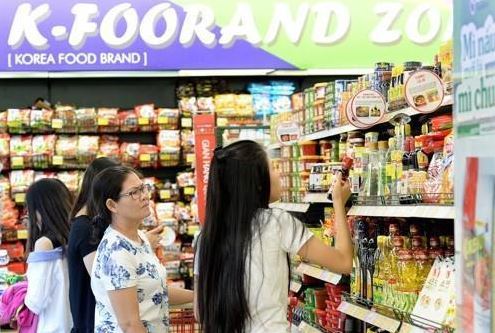South Korean small and medium enterprises exported $12.6 billion worth of goods to Vietnam in 2017, data by a local think tank said Sunday.
According to the Korea Small Business Institute, the Southeast Asian country was the second-largest overseas market for SMEs, with outbound shipment growth surging 33.4 percent over 2016.
The country was the second-largest destination for products made by medium and small local companies, coming in second only to China. In the previous year, Vietnam was the fourth-largest overseas market.
KOSBI said wireless telecommunications equipment, knitted textiles, and plastics were the main export items to Vietnam.

Total South Korean exports to the country reached $47.8 billion last year, accounting for 8.3 percent of all outbound shipments and making the country the third-largest market behind China and the United States.
The think tank, which works to facilitate the sustainable development of SMEs, said Vietnam is attractive as it has a population of over 90 million with annual economic growth reaching 6-7 percent.
"By the late 2020s, the country's population should exceed 100 million and will likely become the central economic power in the Indochinese Peninsula," it predicted.
The institute added that because of the popularity of Korean Wave or "hallyu" and the strong presence of companies like LG, Samsung and Hyundai Motor, Vietnamese consumers have favorable impressions of South Korean products.
Hallyu refers to the popularity of South Korean TV shows and music that have secured hordes of fans in Asia, Europe and the American continent.
KOSBI then said for SMEs to expand their presence in the country and the rest of Southeast Asia, it is advisable to make full use of the Vietnam's special economic zones.
The think tank said it is advisable for SMEs to follow a so-called multi-product, small-sized production strategy when selling consumer goods in the country. This, it said, can best meet particular market needs of the country.
On the other hand, it warned that companies needed to carefully think through any investments due to frequent labor strikes and the difficulty in finding skilled workers. (Yonhap)






![[Weekender] How DDP emerged as an icon of Seoul](http://res.heraldm.com/phpwas/restmb_idxmake.php?idx=644&simg=/content/image/2024/04/25/20240425050915_0.jpg&u=)


![[KH Explains] No more 'Michael' at Kakao Games](http://res.heraldm.com/phpwas/restmb_idxmake.php?idx=644&simg=/content/image/2024/04/28/20240428050183_0.jpg&u=20240428180321)








![[Herald Interview] Mistakes turn into blessings in street performance, director says](http://res.heraldm.com/phpwas/restmb_idxmake.php?idx=652&simg=/content/image/2024/04/28/20240428050150_0.jpg&u=20240428174656)
